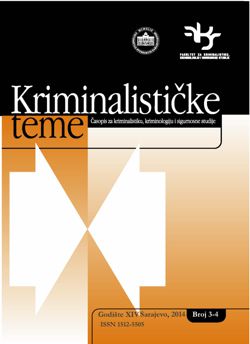METODOLOGIJA KRIZNOG KOMUNICIRANJA I ANALITIKA MEDIJSKIH ISKAZA
CRISIS COMMUNICATIONS METHODOLOGY AND MEDIA STATEMENTS ANALYTICS
Author(s): Srđan M. Milašinović, Zoran B. JevtovićSubject(s): Media studies, Security and defense, Theory of Communication, Methodology and research technology, Social Informatics
Published by: Fakultet za kriminalistiku, kriminologiju i sigurnosne studije Univerziteta u Sarajevu
Keywords: Methodology of Crisis Communication; Media Statements Analytics; Information Management; Security;
Summary/Abstract: In modern society, mass media communication institutions take the role for constructing conflicting paradigms, by conducting not only informative but, in addition, a certain security, psychological as well as propaganda features and tasks. Risks, crises, disasters, revolutions, violence and conflicts are becoming part of the global everyday life, but media information of their intensity, such as depth, goals, causes and consequences, define the character of interventions and determine the methodology of a particular activity. European environment clearly emphasizes the cognitive-institutional approach that focuses on the security analysis activities of many individuals, groups, networks and institutions, sensual perception and cognition of people who are primarily engaged with the crisis, as well as the group and institutional framework within which decisions are made. By the analysis of media statements and sources, those related to the prevention and public preparation for the crisis, identification of the actors of crisis management, crisis perception and management, political and organizational cooperation, crisis communications (collection and information processing, digital information transfer systems, communication with the public and the role of the emerging media in crisis management), the internationalization of the crisis, time effects and costs of the crisis, as well as gaining the publicity and public agreement are observed. Statistical data analysis, deduction and comparison in accordance with the analytical stages, topics, variables and indicators, allow the creation of complete overview of the crisis nature, resolving risks and the action priorities.
Journal: Kriminalističke teme – Časopis za kriminalistiku, kriminologiju i sigurnosne studije
- Issue Year: XIV/2014
- Issue No: 3-4
- Page Range: 17-25
- Page Count: 9
- Language: Bosnian, Croatian, Serbian

